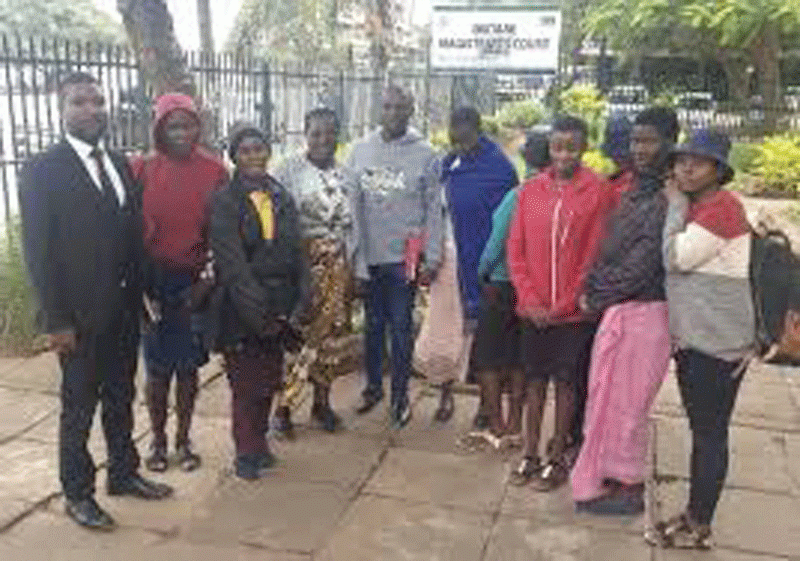
BY FRED ZINDI
The coronavirus pandemic began to take hold a year ago. While some musicians were wondering what to do with this new situation, Ernest Kambadzo, popularly known as Tanga WekwaSando, figured — as a musician and artiste — he would be as well equipped to deal with it.
Like thousands of other people who work in the creative industries and have been hit hard by the Covid-19 pandemic, Tanga WekwaSando has had his life upended in ways the usual ebb and flow of the gig economy could not allow him to anticipate.
Loss of outdoor shows, including loss of performance at his own club, PaFio Entertainment Centre (where he was restricted to entertain a maximum of 50 patrons only), meant that the artiste had to improvise other ways of keeping himself occupied. The large-scale dissolution of the gig economy for artistes during lockdown meant a radical sea change.
Tanga did not have to think hard on what to do next. Each time he had an inspiration, even at midnight, he would simply wake up and walk into his HakunaMatata home-studio and lay down a track or two for his next album, bearing in mind that whatever he lay down must adhere to either the 3/4 time signatures to make a difference in the beats to his Southern African music.
In his own words: “We need to bring back the jiti and mbakumba beat which is truly Zimbabwean, to the fore. Rhythms such as Zimdancehall are not really Zimbabwean although they have grown in popularity. Those rhythms are copied from Jamaican music. It is time we brought back true Zimbabwean rhythms.”
I have been battling for years trying to define what the truly Zimbabwean beat is. Sungura has found its way here via the DRC and East Africa while Zimdancehall is known to have come from Jamaica. Unlike the Zimdancehall artistes who have been influenced by Jamaican music, Sando has no doubt, been influenced by American jazz as evidenced by his scat singing on some of his tracks.
In American jazz, scat singing is vocal improvisation with wordless vocables, nonsense syllables or without words at all. In scat singing, the singer improvises melodies and rhythms using the voice as an instrument rather than a speaking medium.
- Chamisa under fire over US$120K donation
- Mavhunga puts DeMbare into Chibuku quarterfinals
- Pension funds bet on Cabora Bassa oilfields
- Councils defy govt fire tender directive
Keep Reading
Sando has been known to do this on some of his tunes. Sometimes he delves into improvisation and syncopation which are well-known American jazz elements.
His statement above that he is about to release a true Zimbabwean beat will only be vindicated by his new offering, Jiti Love. I am yet to listen to the album to decide if the statement rings true.
In an effort to make his dream a reality, Tanga has compiled a seven-track album titled Jiti Love which will be launched at the end of April.
According to him, the album is going to be better than anything else he has done in the past. This is how he put it: “If you thought that Wake was a scorcher, wait until you hear this one. I have now finalised six of the tracks, but I am struggling to find a suitable seventh track out of the many tracks I have recorded in order to complete the album.”
I asked him to send me a preview copy. He said he would, but by the time of going to press I had not received it. We all look forward to hearing this masterpiece.
Many people discovered Tanga WekwaSando at the musical galas that were being held countrywide between 2002 and 2004 after he released the hit single Wake.
However, very few people know that he has been a musician since the 1970s when he performed with groups such as The Harare Mambo Band, Movement, Aces Wildflower, Baked Beans, Octave and Unitee.
Some of the outstanding musicians he performed with include the iconic Clancy Mbirimi, Bothwell Nyamhondera, David Marumahoko, Jethro Shasha, Louis Mhlanga, Chris Chabuka, Sam “Banana” Gwanzura, Alton Edwards, Barney De Souza, Johnny “Papas” Ruzive, Bradshaw Mandishona and Henry Peters.
Tanga WekwaSando was born at Harare Central Hospital on August 1, 1954 and grew up in Harare’s Highfield township.
He began his musical career in the early 1970s by playing the tambourine in the Salvation Army Youth Band together with the late Lennox Chibanda who later became a jazz promoter. He also learned to play the saxophone and trombone while in the Salvation Army Band.
His first professional group was the Harare Mambo Band which was led by Greenford Jangano.
Jangano was known for instituting and instilling strict discipline into musicians, of which Sando is today thankful.
The venues they played at included Mushandirapamwe Hotel, Queen’s Hotel, Carnaby’s and at the Bulawayo Trade Fair, where they fetched prizes for two consecutive years.
In 1977, during the troubled Rhodesia times and at the peak of the war of liberation, Tanga went to Botswana, where he played the trombone for The Gaborone Town Orchestra.
After a short stint, he left the orchestra and went to the United States to further his studies at the University of Indiana, and majored in International Economics and Finance.
At Indiana University, he started writing music seriously, and ended up living in a car trailer in the park, to have more time to himself.
He recorded music in Bloomington, where he played in a band with five white guys. Being ambitious and adventurous, Sando moved to New York, to try his luck for a music job. He was hired at Tower Records Departmental Store in the intelligence (security) section.
There, he met international artistes, such as Janet Jackson, Stevie Wonder and Barry White, who would sign autographs upon release of their records.
After three years, he left to work for the Frankstock Fund which had funded his studies in the US.
When Sando returned to Zimbabwe, he immediately embarked on a musical project and formed the band “Giraffe”’ in which he teamed up with Bothwell Nyamhondera and recorded the hits Mahobho and Vakomana Vekwedu, among others.
When Giraffe disbanded, he went solo as Tanga WekwaSando, producing spectacular hits such as Wake, Nyenyedzi yeMugovera, Bharanzi, Shungu, WekuMbare, PaFio (Highfield), and Wangu Wangu. The song WekuMbare (Of Mbare) is dedicated to township jazz artistessuch as; pianist Chris Chabuka, drummer Johnny Papas, guitarist Sam Banana and saxophonist/bassist Simangaliso Tutani, among others. WekuMbare had been popularised before by the late Sam Banana.
In 2004 Sando won the National Arts Merit Award for the best selling musical artiste. Tanga is proud of this recognition.
What makes Tanga WekwaSando’s music unique is his ability to add feeling to harmony, to convey sadness, joy and finally triumph.
It is not easy to pin Sando’s pulsating music to one particular genre, although he uses township music as his predominant vehicle for fusion.
In his new album, Jiti Love, he tells me that he concentrates on the 3/4 beats to give it an outstanding and unique Afro-fusion approach.
In my opinion, Tanga’s music from what I have heard in the past can simply be described as Afro-jazz fusion since it is a mixture of township music, marabi, tsaba-tsaba and jazz. Tanga is an example of an all-rounder. The musical theme cuts across the social fabric, laden with messages for everyone.
Tanga, who had been quiet for a while, was up to three years ago reviving township music at his Highfield home-ground. This was before the Covid-19 pandemic outbreak. He called it PaFio Outdoor events which were being held under the banner of PaFio Arts and Entertainment Centre. The centre also offered outdoor braai and what is commonly known as gochi-gochi.
Sando was last seen in 2018 giving a performance at this place every Saturday where he offered entertainment for both music and sports lovers. His move to perform every Saturday at PaFio gave revellers and fledgling talent in the neighbourhood an opportunity to hobnob with some of the country’s finest musicians. Other musicians who came to perform at this centre included Bob ‘The Headmaster’ Nyabinde, John ‘Chibhobhoro’ Muyambo and Jabavu Drive.
We do hope that after the Covid-19 pandemic restrictions are lifted and gone forever, PaFio Entertainment Centre will soon be destined for even greater entertainment.
- Feedback: [email protected]











